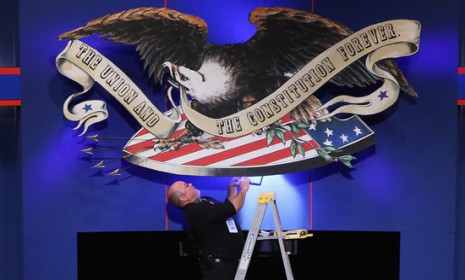The debate that probably won't matter
Poor veeps; they won't get respect


A free daily email with the biggest news stories of the day – and the best features from TheWeek.com
You are now subscribed
Your newsletter sign-up was successful
It would be tempting to assume that, because the political class is obsessed with the vice presidential debate, that Americans will transmute their feelings about the relative debating skills of the vice presidential candidates onto their mental projections of the presidential candidates. Beyond one basic threshold — that of competence — that hasn't happened.
The reason why Joe Biden's debate with Sarah Palin mattered so much last cycle is that Palin had yet to cross the competency threshold. She did not appear to be ready to be on stage with three other national political figures who could plausibly be president. Say what you want to about Paul Ryan, but he is a plausible commander-in-chief. In some sense, then, he has already "won" the debate.
But even implausible candidates, like Dan Quayle, can have bumbling debate performances and still not have much of an effect of the top of the ticket. I was listening to former Dukakis-Bentsen campaign manager Susan Estrich tell Fox News recently how, at the conclusion of that debate, in which Quayle's feathers were clipped, the dial groups showed unanimously that Bentsen had won by every measure. And yet — the bad news — was that the views of the top of the ticket had not changed.
The Week
Escape your echo chamber. Get the facts behind the news, plus analysis from multiple perspectives.

Sign up for The Week's Free Newsletters
From our morning news briefing to a weekly Good News Newsletter, get the best of The Week delivered directly to your inbox.
From our morning news briefing to a weekly Good News Newsletter, get the best of The Week delivered directly to your inbox.
Biden, who is fantastic in these formats when he doesn't have to play nice (as he did, quite obviously, with Palin), should not have the weight of the ticket's renaissance on his shoulders.
The one caveat that occurs to me here is that technology and information consumption patterns have shifted to A-gear so much so that if the political class wants to force the public to make more of a big deal about the vice presidential ticket than they might, then perhaps a rousing debate from Ryan or Biden will shift things.
But I doubt it.
A free daily email with the biggest news stories of the day – and the best features from TheWeek.com
Marc Ambinder is TheWeek.com's editor-at-large. He is the author, with D.B. Grady, of The Command and Deep State: Inside the Government Secrecy Industry. Marc is also a contributing editor for The Atlantic and GQ. Formerly, he served as White House correspondent for National Journal, chief political consultant for CBS News, and politics editor at The Atlantic. Marc is a 2001 graduate of Harvard. He is married to Michael Park, a corporate strategy consultant, and lives in Los Angeles.
